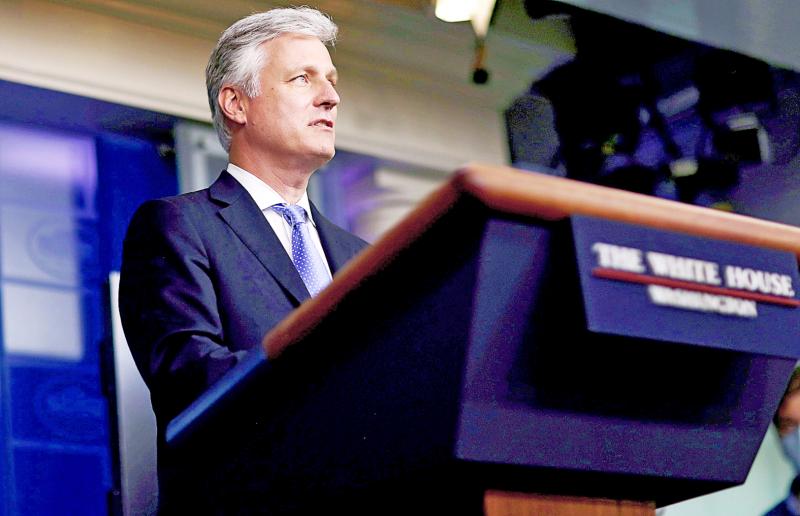US National Security Adviser Robert O’Brien on Wednesday warned China against any attempt to take Taiwan by force, saying amphibious landings were notoriously difficult and there was a lot of ambiguity about how the US would respond.
O’Brien told an event at the University of Nevada in Las Vegas that China was engaged in a massive naval buildup probably not seen since Germany’s attempt to compete with Britain’s Royal Navy prior to World War I.
“Part of that is to give them the ability to push us back out of the Western Pacific and allow them to engage in an amphibious landing in Taiwan,” O’Brien said.
“The problem with that is that amphibious landings are notoriously difficult,” O’Brien added, pointing to the 160km distance between China and Taiwan, and the paucity of landing beaches.
“It’s not an easy task and there’s also a lot of ambiguity about what the United States would do in response to an attack by China on Taiwan,” he added, when asked what the US options would be if China tried to absorb Taiwan.
O’Brien was referring to a long-standing US policy of “strategic ambiguity” on the question of whether it would intervene to protect Taiwan.
The US is required by law to provide Taiwan with the means to defend itself, but it has not made clear whether it would intervene militarily in the event of a Chinese attack, something that would likely lead to a much broader conflict.
O’Brien’s comments came at a time when China has significantly stepped up military activity near Taiwan and US-China relations have plunged to the lowest point in decades.
O’Brien repeated US calls for Taiwan to spend more on its own defense and to carry out military reforms that make clear to China the risks of attempting to invade.
“You can’t just spend 1 percent of your GDP, which the Taiwanese have been doing — 1.2 percent — on defense and hope to deter a China that’s been engaged in the most massive military buildup in 70 years,” he said.
Taiwan needed to “turn themselves into a porcupine” militarily, he said.
“Lions generally don’t like to eat porcupines,” he added.
US Principal Deputy Assistant Secretary of Defense for Indo-Pacific Security Affairs David Helvey on Tuesday called Taiwan’s plan to boost defense spending by US$1.4 billion next year insufficient.
Taiwan needed to invest in more cruise missiles, fast-attack craft, naval mines, mobile artillery and advanced surveillance assets, he said.
In Taipei, the Ministry of National Defense (MND), in a response provided to Reuters, yesterday said that it would “strive for an adequate budget” in accordance with its needs to build a solid national defense force.
The ministry also confirmed that a US MC-130J aircraft had flown along the median line of the Taiwan Strait.
The US Air Force special operations transport aircraft flew into the Strait from the north at about 11am and headed south through the Strait before veering off toward the southeast at about 12:30pm, a civilian plane spotter said in a post on Twitter.
The flight could have been a confirmation of the median line in the Strait after the Chinese Ministry of Foreign Affairs last month denied its existence.
The median line is thought to have been established by the US in the 1950s to prevent further conflict between China and Taiwan.
MND spokesman Shih Shun-wen (史順文) said that the military has been closely monitoring all movement around Taiwan, adding that there was nothing out of the ordinary about the plane’s passage.
Additional reporting by CNA
Source: Taipei Times - 2020/10/09





















